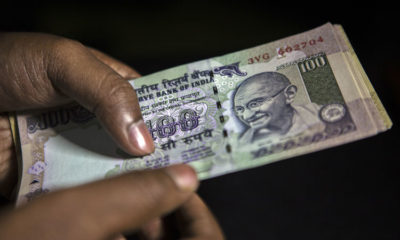- Boeing Wins $22 Billion Plane Order From India’s SpiceJet
Boeing Co. won an order for 205 planes from SpiceJet Ltd., marking the biggest expansion plan by the Indian budget carrier that is seeking to claw back market share from leader IndiGo.
The deal, which includes 100 firm 737 Max 8 jets, builds on an existing order for 55 aircraft, SpiceJet said in a statement Friday. The airline also has the option to buy 50 more, including widebodies. All combined, the order is worth $22 billion at list prices, the airline said, before discounts that are customary for large orders.
The order, the largest ever placed by an Indian airline for Boeing aircraft, signals the resurgence of SpiceJet as it competes against IndiGo, which has some 400-odd aircraft pending delivery from Airbus SE and controls the world’s fastest-growing major aviation market with a 42 percent share. For Boeing, it marks the widening of its footprint in the South Asian country, where its European rival dominates narrow-body fleets.
“We spent a considerable amount of time negotiating and finalizing the commercial terms, including maintenance of the aircraft,” Chairman Ajay Singh said in an interview. “It was important for us to get all the commercial terms right.”
Delivery Schedule
The planes are for delivery between next year and 2024, he told reporters separately in New Delhi. The deal adds to the 348 jetliner sales garnered by the Chicago-based planemaker in India.
The purchase commitment comes at a time when both Airbus and Boeing are facing slowing jet sales and the highest level of airplane-delivery deferrals in at least 15 years after a decade-long jetliner shopping spree globally.
SpiceJet’s order includes a previously unfulfilled and renegotiated deal for 42 jets and an earlier undisclosed order for 13 planes. The airline currently operates a fleet of 32 Boeing 737 jets and 17 Bombardier Q400 turboprops, according to the company. It controls 13 percent of a market that has seen local carriers almost double to 11 in the past five years.
SpiceJet shares have more than tripled since December 2014, when it ran out of cash and grounded its fleet for a day after oil companies refused fuel credit. The stock rose 3.5 percent to 66.15 rupees as of 12:38 p.m. in Mumbai, giving the airline a market value of 39.7 billion rupees ($582 million).
The airline was profitable in each of the past seven quarters and had cash and near-cash items totaling 1.97 billion rupees as of Sept. 30, according to data compiled by Bloomberg.
Slowdown Risk
“The bigger concern we believe will be with SpiceJet’s financial backing and the willingness of banks to fund this growth,” Mark D. Martin, founder of Dubai-based Martin Consulting LLC, said by phone. “The bigger concern for aviation in India is on account of the economic slowdown caused by the recent step to demonetize the most popular denominations in use.”
Add to that the rise in fuel prices, the net effect on the cost of travel will be at least 20 percent, he said.
SpiceJet does not need to dilute any equity to pay for the order, Singh said. The carrier has sufficient resources within the company, and has already received interest from lessors and lenders to finance the deal, he said. SpiceJet will expand its international operations after the new planes with a longer range come in.
India, where an emerging middle-class is flying for the first time and passenger traffic is growing at double the pace of nearest rival China, is a crucial market for Boeing and Airbus. In 2015, IndiGo, operated by InterGlobe Aviation Ltd., ordered 250 planes from Airbus valued at $27 billion. That followed a 2006 deal for 100 A320 planes and 180 A320neos in 2011.
The South Asian country needs 1,850 new aircraft worth $265 billion in 20 years, with single-aisle planes making up a bulk of the new deliveries, according to Boeing forecasts. Airbus dominates the budget airline market in India, with IndiGo, Go Airlines India Pvt. and the local unit of AirAsia Bhd. all flying its jets.


 Forex2 weeks ago
Forex2 weeks ago


 Naira2 weeks ago
Naira2 weeks ago
 Billionaire Watch1 week ago
Billionaire Watch1 week ago




 Naira2 weeks ago
Naira2 weeks ago




 Naira1 week ago
Naira1 week ago




 Naira4 weeks ago
Naira4 weeks ago
 Nigerian Exchange Limited4 weeks ago
Nigerian Exchange Limited4 weeks ago


 Naira3 days ago
Naira3 days ago



















